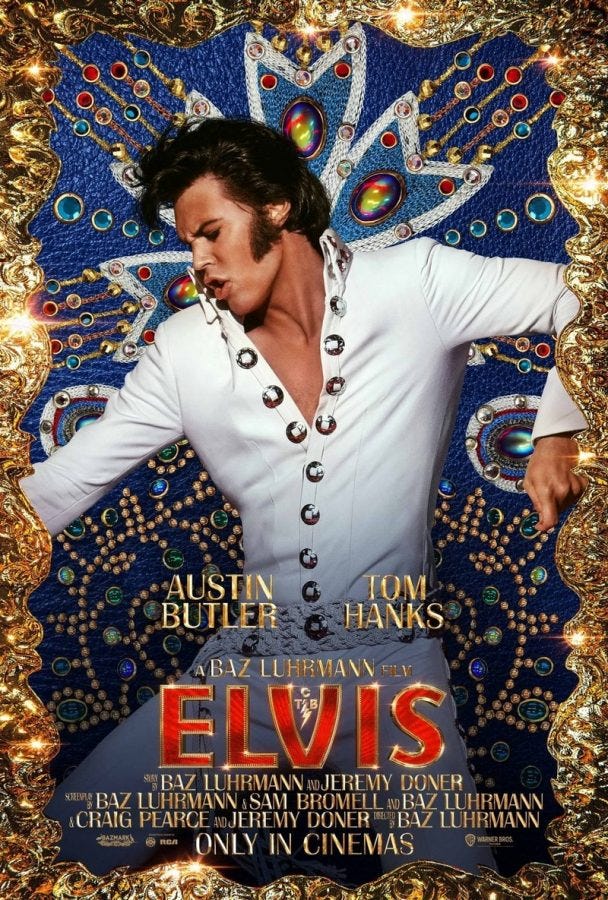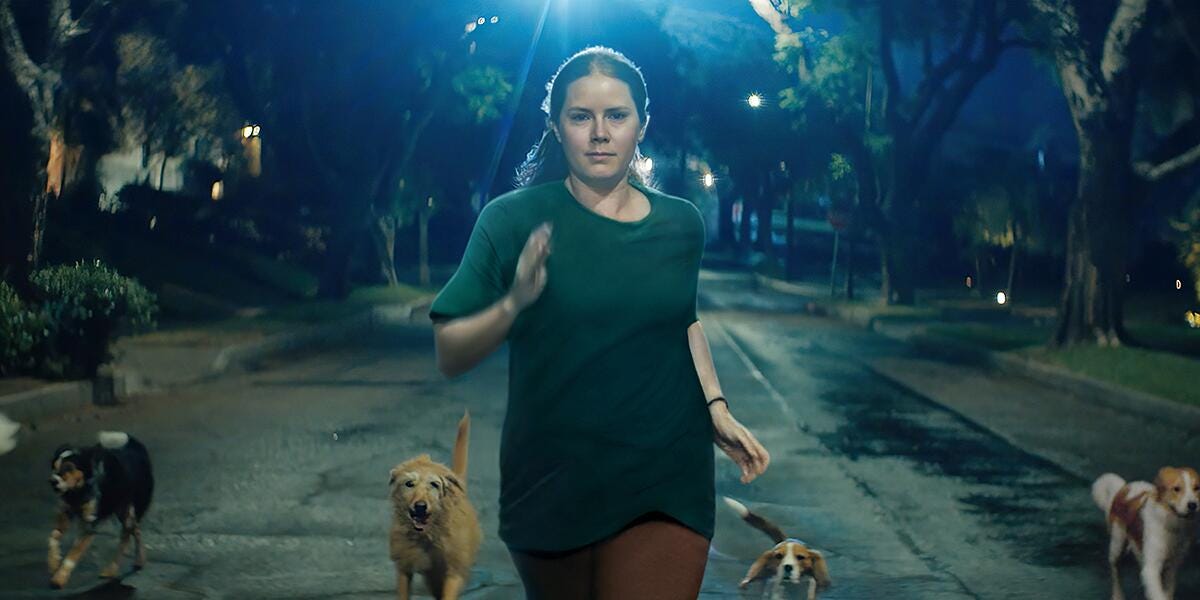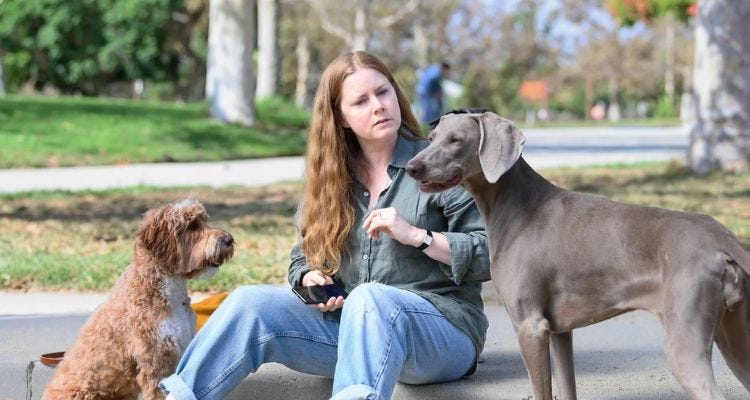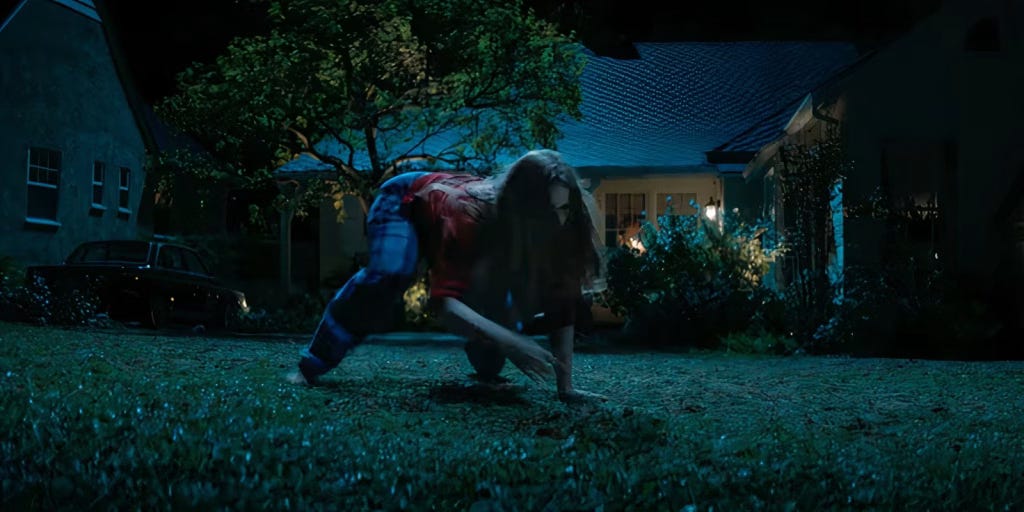Motherhood is a Bitch in "Nightbitch"
An all-female produced and directed horror-satire film about the trials and tribulations of motherhood offers up some poignant truths and cinematic structural challenges
Spoilers ahead.
In Nightbitch [Trailer], the new biting satire on the brain-numbing quotidian life of stay-at-home bourgeois motherhood in modern times, the talented and versatile Amy Adams (Mother) undergoes a metamorphosis. She transforms into a dog to cope with the realities of maternal loneliness and a lack of joy in sacrificing her art career to care for her overactive toddler. Scoot McNairy, who plays Husband, has become the de facto horror husband (Speak No Evil) of our times. He is empathetic yet slightly oblivious and, here, under-equipped to deal with his wife’s transition. Their fraught dynamic and the inequities in parental responsibilities are an undercurrent of the film.
The film, based on Rachel Yoder's 2021 best-selling novel of the same name, is a magic realism book. As such, when translated into a cinematic format, it forces the viewer to fully believe that Mother is physically evolving into a dog. This was part of the film I most enjoyed because it fused aspects of female physical changes and youthful identity, such as the growth of unwanted body hair and gray hairs and sudden cravings for meat, with a blasé nonchalance. The memo states that becoming a mother forces a metaphysical transformation that kills any remnant of the before being. And often, this realization is brutal.
Side Note: In younger motherhood, such thoughts used to depress me because I continually mourned the “before” me. The one I identified as bold, fierce, and driven by the desire to produce and publish great work. Not to mention, the one where I had a waist line and fewer wrinkles. There’s a line in the film where Adams speaks of “delaying greatness” for the sake of her newfound role as “mother.” There’s quite a few lines in this film that new mothers and more experienced ones, such as myself, will relate and connect with.
Mommy & Me Stuff
One of the areas the film focuses on is the incessant activity-filled “Mommy & Me” class culture and its posse of cool moms. At the beginning of the film, Mother is resistant and critical of the other moms, who instantly take a liking to her based on her “boho chic meets Birkenstocks” aesthetic and former artist identity. Adam’s character bristles at their warmth in a way that I imagine feels familiar to people who subscribe to the Groucho Marx doctrine of “wouldn't want to belong to a club that would have me as a member.”
The supporting cast of millennial comedic actresses (Zoe Chao and Mary Holland), who portray members of the baby book group and Mommy & Me yoga class, initially comes across as grating. This perception stems from Adam's Mother's character viewing them as shallow and disconnected from her experiences. She even expresses her skepticism in becoming part of their friend group, stating, "I think becoming friends with another woman just because she's a mother is ridiculous." While this sentiment may seem valid at first glance, Adams gradually discovers she shares commonalities with these women due to their shared experiences of childbirth and child-rearing. As the story progresses, she realizes that their bond goes beyond superficial connections, rooted in the profound journey of creating and nurturing life.
Being a Dog Has Its Perks
The physical manifestations that go along with Adam’s evolution to a dog and her eventual full-on dog transformation also allow for sweet and tender moments shared with her son, during which she’s able to engage with him in active play mode. When we see them both eating from respective dog bowls and her son finally being able to wean off his binky by sleeping in a dog bed, we can admit that being a dog is not all bad. The benefits of maternal play might even be an article one would expect to find on Goop, Gwyneth Paltrow’s lifestyle brand that sells an image of post-modern feminity and motherhood that feels alien to 99% of mothers out there. Only here, with Amy Adams, does it work because Adams is every woman in a way that Paltrow isn’t.
Summary
Nightbitch is an important cinematic oeuvre in the vernacular of maternal identity in the 21st Century. The film’s execution is far from perfect, especially in how it unfolds in the final third. Loose ends are tied up without acknowledging how change will be sustained. Mother’s decision to separate from her Husband is abrupt (not unsubstantiated). While it leads to her finally having time to create art since she’s not chasing a toddler, the ambiguity in how the couple magically works when they inevitably get back together is perhaps the biggest moment of magical realism. We assume it all goes well, as the final scene involves her giving birth to another kid. Behavioral changes and relationship responsibilities in divvying up parental work require hard effort, communication, and not just fun play. This is where the film felt lacking in substance and not very much rooted in realism. Then again, this is a film about a woman becoming a dog. We don’t know, in the end, if she continually goes back to being a dog, if this is part of her identity long-term, or if she’s done with the dog business after she goes through her existential crisis. I suppose it doesn't matter.
There’s an on-the-nose line in the film in which the husband, off for a four-day work trip, senses the mother’s resignation and emotional frustrations and says to her, “Happiness is a choice.” This simplistic view of the world forces us to ignore the impact of centuries of patriarchal roles and conventions or how such a dynamic forms the basis for how things are done.
The film shines when it showcases the strength and power of the maternal community. It stresses the importance of female models - our mothers, their mothers - and how witnessing their actions forms our perceptions of the world. There’s a reflective scene in which Adam’s “Mother” character looks back at her mother’s lack of joy as a stalemate of sorts - she loved being a mother and yet experienced sadness at the choices that either made for her or that she chose. Between the lines, we read that such role models have profound effects on how we choose to live our lives as mothers and normalize what can sometimes be sadness and grief of another sort -that of shedding a former identity.
Twin Films
For January’s Film Chat, we’ll discuss “Twin Films,” which refer to films with the same or similar plots released at different studios at different times.*
In January, we will discuss Baz Luhrmann’s Elvis (2022) and Sofia Coppola’s Priscilla (2023).


Be sure to check out the Romance Film Lovers Club Chat.
*Thanks to Ofifoto, for January’s film club recommendation!
A special thank you to Searchlight Pictures for the advanced screening of this film.






Based on the title alone I thought this was going to be a horror movie about a night nurse who torments the family she works for! 😂
Incredible review! So glad to hear that the movie is more than what the initial feedback online seemed to lead many to believe from just the trailer. I look forward to watching this one in the future.